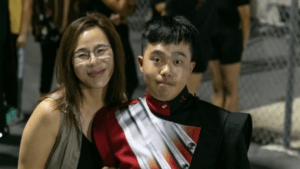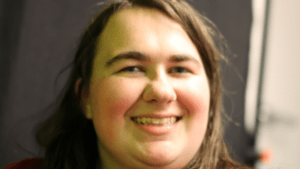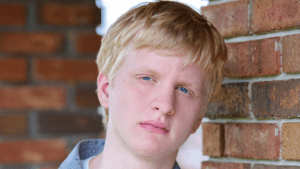This guest post is by John ‘Charlie’ Abb, a young man on the autism spectrum who has been accepted and is attending University of North Carolina School of the Arts (UNCSA), Winston-Salem studying Digital Computer Graphics. Charlie is applying for the Spring 2020 Making a Difference Autism Scholarship via the nonprofit KFM Making a Difference started by me, Kerry Magro. I was nonverbal till 2.5 and diagnosed with autism at 4 and you can read more about my organization here. Can I ask for a favor? I’m trying to make this nonprofit self-sufficient so I can make this my full-time job supporting the special needs community and would appreciate you taking a minute before reading on to watch this video below and subscribing to our Youtube page here to get to learn more about the work we do in the community.
I hope you can support my nonprofit like I’m trying to support these students with scholarship aid for college. Learn more on how you can help our cause with a small donation (just asking for $3 today, equal to your daily cup of coffee) here.
I once saw an ESPN profile of Clay Marzo, a professional surfer with autism. The main take away from the profile was that Clay was a phenomenal surfer because of his Asperger’s not despite it. Asperger’s gave him a unique ability to shut out the rest of the world and focus intently on the wave he was riding. I too, choose to focus on the gifts while managing the challenges. It is a message I have tried to share with others.
My name is John “Charlie” Abb. Allow me to share with you my experience with autism and what ideas I’ve come up with as a result to see if autism is truly a challenge, a gift, or a bit of both? There are actually a lot of layers to consider in regard to living with autism. We too often focus simply on the challenges, quirks and stereotypes and not enough on the many bright sides involved.
Living with autism presented many different challenges unique to me. One of my biggest issues is having intense interests in certain things at the expense of others. I have been a tremendous enthusiast of films for as long as I can remember. I can honestly tell you every movie I have ever seen and when. I am very much attracted to the realm of action and fiction, and to films that successfully integrate strong visual effects elements. Which is why I have been working to earn a career as an animator and filmmaker. Because I love films so much, when I was younger, I would blabber endlessly about movies until someone told me to stop, or tune out any conversation that I felt was of no interest to me unless it had something to do with a movie. My difficulty in maintaining interest in things outside of film especially became an issue in being able to focus on learning in school. Having autism created a fairly difficult social life and even lead to me being homeschooled from 7th grade onward. All of this would have made my life endlessly miserable. But it didn’t end up that way because I managed to overcome these challenges and focus on the gifts through my drawing, animation and the support I received from my family encouraging my love of film. To give you an idea of how I did so, I would suggest that there are two main obstacles holding back autistic people from realizing their full potential apart from the condition itself: a personal or familial perception that they are victims of their disability; and societal stereotypes unfairly reinforced in schools and workplaces.
Autistic people sometimes allow themselves to be held back by focusing on their challenges without attempting to overcome them. This often stems from parents/siblings who reinforce the negative challenges and fail to build upon the many gifts of autism. For me, I have learned to acknowledge that autism does not define me, and because of its gifts like the increased focus on my interests, I am a better artist, animator and storyteller. Over the years I have learned to become better attuned to the subtleties of people’s expressions and behavior and to capture them in my drawings and my story telling. And, I have learned to be more self-reflective than many of my peers. I have the privilege of parents and friends who never let me believe I am a victim and who work very hard to help me accept being autistic. They fuel my passion for drawing and film and never let any challenge hold me back. My parents served as great role models encouraging me to overcome these challenges and have an active social life. Though I was homeschooled, their encouragement helped me find ways to interact with my peers through co-op classes, earning my Eagle Scout, and earning my 2nd degree black belt while learning and teaching Tae-Kwon Do and Hapkido. I graduated Summa Cum Laude with an Associate of Fine Arts (AFA) in Visual Arts and a member of the Phi Theta Kappa (PTK) honor society from the Durham Technical Community College. With their encouragement, I was accepted into the University of North Carolina School of the Arts (UNCSA) for the fall of 2020. This is why it is extremely important for autistic people to have helpful and encouraging people in their lives. Friends, family, and loved ones who do everything in their power to give them the hope and motivation they need to be productive people and realize their potential.
I believe that a second obstacle is stereotypes. Often young children are labeled early in their academic life with diagnoses that are inaccurate, misunderstood and under resourced. These labels stick and become self-fulfilling where students and parents never challenge their validity and it feeds the sense of victimhood discussed above. You can imagine that many autistic people want to get out of schools that don’t support their interests as quickly as possible. These labels follow students into the workforce. Some employers may immediately discriminate against autistic people regardless of whether or not they know the applicant has challenges that would impact their job performance. The truth is, we really just need a chance to show employers what we can do, and they will realize that over time, we can grow to outperform our neurotypical peers. I know this is true not in theory but in practice. In fact, my father owns and manages an indoor lettuce farm with the purpose of giving jobs to special needs adults working seamlessly side by side with neurotypical peers. This farm models for other companies that they too can employ special needs adults successfully within their businesses.
So, in closing I would suggest that really the only thing that is holding us back is ourselves. We should maintain a positive mental attitude and surround ourselves with people who will help us focus on our gifts not our challenges and then we will realize our full potential.

Follow my journey on Facebook, my Facebook Fan Page, & Instagram!
My name is Kerry Magro, a professional speaker and best-selling author who is also on the autism spectrum that started the nonprofit KFM Making a Difference in 2011 to help students with autism receive scholarship aid to pursue a post-secondary education. Help support me so I can continue to help students with autism go to college by making a tax-deductible donation to our nonprofit here.














